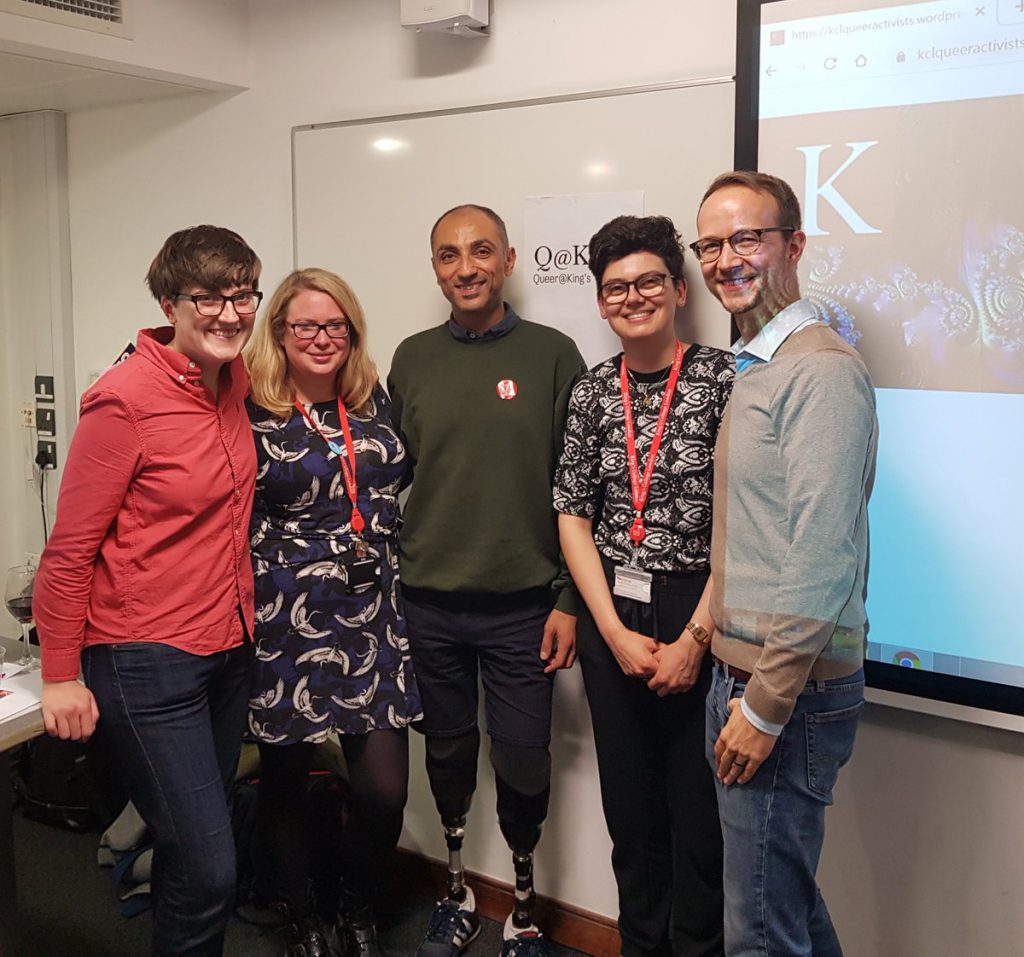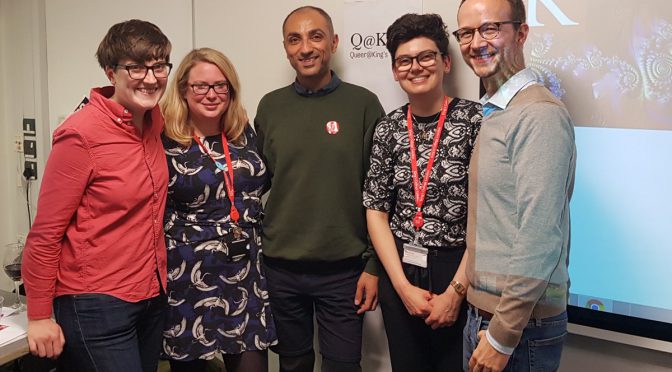In early October, Queer@King’s announced their first ever Activist-in-Residence, Daniel Lul from ParaPride. In this interview, PhD student Katie Arthur speaks to ParaPride Co-Founder, Daniel Lul, and Queer@King’s Director, Sebastian Matzner, about the scheme and their work.

Katie Arthur (KA): Thank you both for taking part in this! I am a member of Queer@King’s and I am so excited that we are running a scheme to engage with activists in the LGBT+ community. I can’t think of a better partner for our inaugural run! Daniel, I would love to know more about ParaPride, but I am wondering if we should start with a word from Sebastian on the thinking behind this scheme?
Sebastian Matzner (SM): I would say there were two main driving ideas behind this initiative: on the one hand, Queer@King’s has always considered itself an ally of and amplifier for LGBTQ+ activism outside of the academy – we are in the same struggle but rarely in direct dialogue. We wanted to change that, so that we might learn from and support each other more. On the other hand, there has been a widening of the gap between critical, theoretical reflection on gender and sexuality (especially under the notion of queerness) and concrete work for particular steps to improve the lives of LGBTQ+ individuals and communities. Again, we wanted to close that gap so that theorisation and critique do not lose sight of the realities of lived experiences, and activism and politics can benefit from the impulses and challenges of wider critical reflection.
KA: Daniel, can you tell us more about ParaPride and the work you do?
Daniel Lul (DL): Thank you Katie and Sebastian, we are very excited about this brand new collaboration. ParaPride is a new organisation that focuses on the intersection between the LGBTQ and disabled communities. We officially launched in May this year, and in August 2019 we celebrated the very first ParaPride, which is essentially an all-inclusive, fully-accessible Pride event that caters for different types of disabilities (physical, sensory, non-visible, etc), and that features a line-up of predominantly LGBTQ performers with disabilities. Additionally to this, we also organise smaller events during the year, such as social outings as well as workshops, as part of ParaPride’s Community Outreach project.
Through ParaPride we want to ensure the experience of all members of the LGBTQ community is fun, welcoming and equal. We intend to achieve this ambition through three main pillars: increasing visibility and volume of inclusive spaces for disabled LGBTQ people; producing events and working with social spaces to produce events that cater for people with different impairments; promoting information and awareness training for better consideration of the obstacles faced by these communities.
KA: The website for ParaPride mentions inclusivity and accessibility within the LGBT+ community and that’s something we’re seeing discussed more and more. The LGBT+ community has certainly not been immune from forms of prejudice and exclusivity. Do you think we are witnessing a shift in awareness within the LGBT+ community itself?
DL: There is definitely a great need to address the lack of access and inclusion within the LGBTQ community. A need for more inclusive LGBTQ spaces that can cater for different types of disabilities, and a need to promote sex positivity around different bodies and celebrating that. For too long people with disabilities have traditionally been unintentionally excluded from the common experience. This needs to change. By giving visibility and more representation to disabled people through empowerment, we can change that. Since opening a dialogue through ParaPride about inclusion and accessibility, we have been receiving a lot of encouragement and endorsements by other amazing organisations such as Stonewall, LGBT+ Consortium and the GLA. This proves there is definitely more awareness within our community and willingness to engage with these issues. There is still a very long way to go, but we must take this as a positive sign whilst we move forward.
KA: How do you think we can best ensure that awareness is being translated into inclusive action?
DL: ParaPride works closely with many LGBTQ social spaces, Pride organisers, venues, etc; many of these have been requesting our support to help them become more accessible. We give advice on how they can make quick steps to take action and improve access without necessarily applying infrastructural change. Many can improve their accessibility by making small changes such as adapting service principles; for example: recruiting people that can sign BSL, offering inclusion training, printing high-contrast signage and braille menu versions. These suggestions come with low cost and high impact. Recruiting people with disabilities is very important. As well as giving a fair chance to the individual being recruited it also helps the business, because environments that are accessible for the team members are likely to be accessible for their service-users.
KA: Why do you think it’s so important that the LGBT+ community leads on these issues?
DL: As a community, looking at the LGBTQ history from the Stonewall riots until today, we are supposed to be predisposed to acceptance, giving out a hand in solidarity to one another. This is mostly the case, but sometimes there are tensions that arise within our diverse community. As rightwing populism spreads it is important that we stick together more than ever and not allow our traditions of unity that have driven the campaign for LGBTQ rights and the spirit of collective pride to be threatened. For this reason it is very important that we continue leading by example especially on issues that surround inclusion and equality.
KA: We’re so excited to have ParaPride as the first Activist-in-Residence at Queer@King’s! What would you like to achieve from the residency here?
DL: Since first reading about the Queer@King’s initiative to support and amplify the work of LGBTQ activists, and thinking about the diverse community within ParaPride, (from our creative performers, passionate volunteers and loyal beneficiaries), our initial thoughts were inundated by the endless opportunities this new collaboration could bring. ParaPride is a very new organisation that is fast growing, we have many ideas that we want to put into action. The first thing we want to focus on, in order to achieve the realisation of these projects, is to expand our volunteers team. I had the pleasure to meeting the wider Q&K’s team and the many students present at the ‘Happy New Queer’ event earlier this month, I was so impressed by the level of expertise, experience and aptitudes I came across, and couldn’t stop thinking of the great things that could happen by incorporating these individual talents within ParaPride. It would be amazing to have this support from the residency. In February, we plan to safely run a fully accessible ‘Winter Carnival’ in partnership with The Stratford Arts Centre, to help raise vital funds for ParaPride’s 2020 activity programme. It will be the biggest showcase of disabled queer talent. Please come forward if you want to become a volunteer and help us make history!
KA: It seems like activism is becoming more ingrained in people’s lives, whether in the more traditional sense of formal political organising or in a sense of personal resilience and ‘calling in’. What does activism mean to you?
DL: Activism, to us, means having a voice and using it as a tool to create positive social impact, as a group and as an individual. Through ParaPride, we want to increase visibility and representation for the underrepresented disabled LGBTQ community.
National Awareness Week happened last week, this reminded us that people with disabilities are particularly vulnerable to the effects of homophobia and transphobia and are frequently victims of harassment, abuse, and, in the worst cases, violence. This is an incredibly isolating experience. All members of our community need to be enabled to participate in order to help to combat these effects, as well as to combat the social exclusion that surrounds having a disability more generally. Everyone is entitled to engage with the communities they wish to, build relationships, have fun and feel included.
KA: What role can Higher Education Institutions like King’s play in the facilitation of activism and civic engagement?
DL: The great advantage of having Higher Education Institutions encouraging activist projects is the ability they have to share their many resources. King’s was able to fulfill this role perfectly through the Activist-in-Residence scheme. Thanks to this, ParaPride is able to connect with King’s students, researchers, as well as other useful and valuable qualities, without mentioning the activism budget that will contribute towards our work, giving us higher reach and impact.
KA: What do you think is exciting about LGBT+ activism in 2019?
DL: I think it’s been absolutely amazing to witness an increase of visibility of smaller underrepresented LGBTQ communities, in the UK and around the world, as well as the incredible achievements they’ve been able to obtain by having their powerful voices heard. Being part-African, I was particularly happy and proud to learn about the decriminalisation of homosexuality in Botswana, leading by example among other African countries. Taiwan being the first East Asian country to legalise same-sex marriage. One of my favourite news about LGBTQ activism in 2019 was IMAAN launching the first ever Pride festival in favour of the British Muslim LGBTQ+ community. ParaPride looks up to these incredible activists and feels inspired by their actions.
KA: Daniel and Sebastian, thank you so much for your time today. I think I speak for Queer@King’s and the rest of the King’s community when I say I’m really looking forward to seeing how the residency shapes up. It is really exciting to see how King’s can better support local activism and civic action.
ParaPride believes that everyone is entitled to engage with the LGBTQ community, build relationships and feel included in the activities presented to it. For more information on their work, or to get involved, you can follow ParaPride on Facebook or Twitter.
Queer@King’s is an interdepartmental and interdisciplinary group of researchers that has been operating in the Faculty of Arts & Humanities since 2003. After playing a pioneering role in the research culture of the University of London by bringing together colleagues interested in gender and sexuality, Queer@King’s became one of the Faculty’s official centres in 2006.
Blog posts on King’s English represent the views of the individual authors and neither those of the English Department, nor of King’s College London.
You may also like to read:

